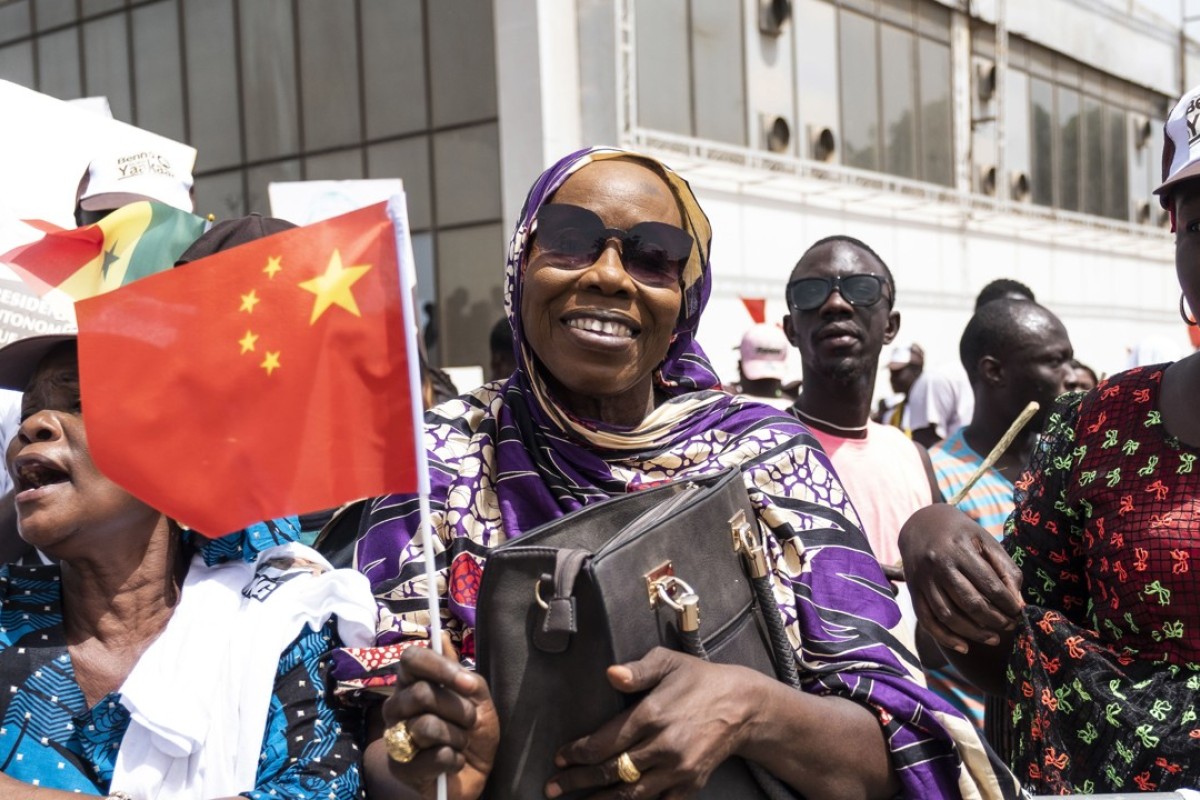China’s Belt and Road Initiative is rooted in the desire to extend the benefits of its great development story | South China Morning Post
China’s Belt and Road Initiative is rooted in the desire to extend the benefits of its great development story
Zhu Feng says China is one of the world’s greatest development stories and its ambitious infrastructure investment plan is an attempt to extend the benefits of the country’s economic growth globally, especially to least-developed nations

Zhu Feng
Published: 2:00am, 10 Oct, 2018

A woman welcomes Chinese President Xi Jinping to Dakar, Senegal, on July 21, 2018. Xi was on a four-nation visit to Africa seeking deeper military and economic ties. Photo: AP
Both the history of international relations and theories in the field show that development is the best way to reduce conflicts among states, mitigate domestic tensions and eliminate the threat of extremist forces such as terrorists. The concept of “development” today not only encompasses economic growth, rising employment and income augment, but also social justice, equality, democracy and legality of governance.
In the 21st century, development also emphasises the harmony between human beings and nature and between the economic and natural environment. The United Nations’ advocacy of “sustainable development” has made environmental protection a primary goal of economic development. Sustainable development has increasingly become the driving force behind a new round of globalisation and a path towards national and regional prosperity and stability.
China’s 40-year reform and opening up is undoubtedly one of the world’s most vivid development stories. With the largest population in the world and huge differences in regional development, China initially lacked the advantages, such as natural endowment and early modernisation, that characterised India, some Southeast Asian countries and Latin America.
However, today, as a
World Bank report notes, China’s economic growth and development has become a powerful engine for global economic growth.
Watch: Xi Jinping’s vision for China’s place in the world
In 2000, China’s gross domestic product only accounted for 10 per cent of the United States’; in 2017, it was 60 per cent. China’s university enrolment rate has increased substantially between 2000 and 2017. The strict “one-child policy” was replaced by a “two-child policy” in 2016.
--------------
In 2000, environmental and ecological contamination was rife due to industrialisation, but by 2017, President Xi Jinping’s words “
green mountains and clear water are equal to mountains of gold and silver” had taken root. The government’s focus on comprehensive ecological management has seen results – Beijing, infamous for its smog, has substantially
improved its air quality. In tackling social justice, the government’s targeted
poverty reduction approach has lifted a large number of people out of poverty.
The two barriers blocking China’s pledge to end poverty by 2020
China’s domestic and diplomatic policies have also developed. Since 1980, China has not taken part in any large-scale foreign military conflicts. Although China still faces continental and maritime territorial disputes in the
South China Sea, East China Sea and with India, dialogue, negotiation and pragmatic cooperation are its basic principles in dealing with these problems. This was exemplified in China and the Association of Southeast Asian Nations agreeing on a draft code of conduct in the South China Sea.
More importantly, China is becoming a significant force in the global push towards development. In 2013, President Xi first promoted the
Belt and Road Initiative , aiming at constructing an economic community by encouraging trade and strengthening infrastructure connections between China and its neighbours. The idea is to take China’s development beyond its borders, establishing a more close-knit political, economic, social and cultural “development circle”.
Watch: South China Sea dispute explained
Now a US$12 trillion economy, China increasingly imports raw materials, while its boosted manufacturing capacity demands more international markets for its products. The Belt and Road Initiative is based on a realistic need to integrate with the world.
From 2008 to 2017, China’s low-interest loans and government assistance to sub-Saharan African and Latin American countries surpassed lending by developed countries. Its development assistance commitment to Africa stands at US$120 billion. This includes free financial aid and soft loans from the government as well as project development loans and import-export financing from Chinese commercial banks.
Trade between China and Africa has grown to US$170 billion in 2017. Chinese-funded projects in Africa employ a large number of African people, not only enhancing the employment rate and tax revenue of local governments, but also promoting unprecedented economic growth in countries such as Ethiopia.
Watch: China ploughs billions into Africa
China’s economic assistance towards developing countries complements the International Monetary Fund and World Bank’s development and aid programmes, especially as the US has blocked IMF loans and bailouts to some countries over the years, most recently Pakistan.
Some Western countries have criticised China for pursuing “economic imperialism” in Africa and for leading developing countries into a “debt trap”. These opinions are based on the assumption that China is a geopolitical competitor. In fact, Chinese leaders have emphasised that, in terms of development aid and economic cooperation, China will not interfere in the internal affairs of recipient countries, attach political conditions or pursue geopolitical interests. Beijing’s principle is “achieving shared growth through discussion and collaboration”.
Today, US President Donald Trump’s administration has been recklessly implementing nationalist economic policies, pounding the world with
tariffsand sanctions. The liberal global trade order is at stake and
emerging economies are suffering from monetary and debt crises.
Despite bleaker world economic prospects, Beijing is still confident of speeding up its domestic reform and opening-up programme while stimulating global economic growth as a responsible international stakeholder.
In doing its part to build “
a community with a shared future for mankind”, China hopes more countries will help construct a better world and scale new peaks of political, economic and social development in the 21st century together.
Zhu Feng is dean of the Institute of International Relations, and executive director of the China Centre for Collaborative Studies of the South China Sea, at Nanjing University
No comments:
Post a Comment